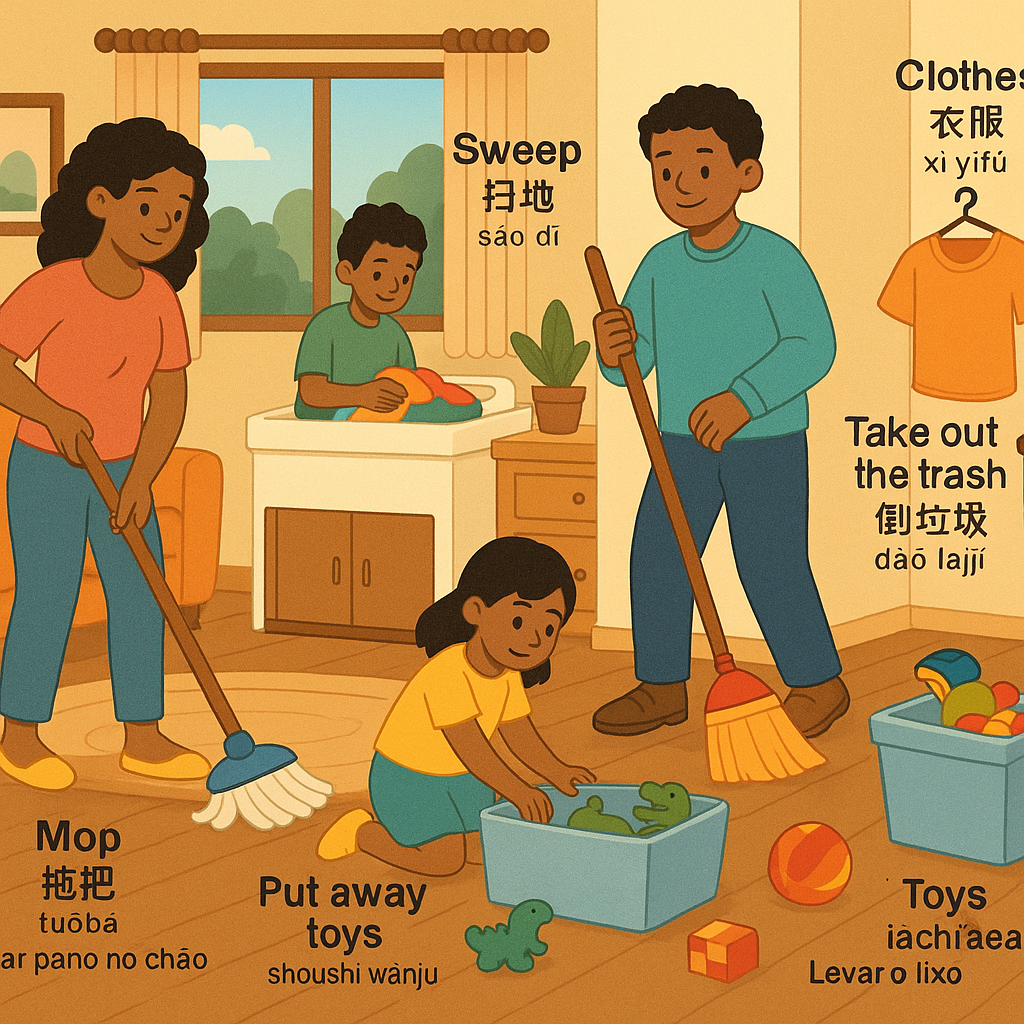🔤 Languages: English | 中文 (Mandarin, with Pinyin) | Português
📘 Level: Beginner
🧽 Topic: Vocabulary and sentences related to household chores
🎯 Objective / 目标 / Objetivo
By the end of this lesson, you will:
✔️ Name common household chores
✔️ Describe your cleaning routine
✔️ Use action verbs related to cleaning and organizing
✔️ Practice full trilingual sentences for real-world use
📖 1. English Introduction (Main Language)
Household chores are an essential part of daily life. From cleaning the floor to washing clothes and organizing the house, these activities are common in every culture. Learning how to describe these actions in multiple languages helps you communicate better about routines and responsibilities at home.
📚 2. Vocabulary | 词汇 | Vocabulário
| English | 中文 (Mandarin) | Pinyin | Português |
|---|---|---|---|
| Chores | 家务 | jiāwù | Tarefas domésticas |
| To clean | 打扫 | dǎsǎo | Limpar |
| To wash clothes | 洗衣服 | xǐ yīfú | Lavar roupa |
| To iron clothes | 熨衣服 | yùn yīfú | Passar roupa |
| To sweep | 扫地 | sǎo dì | Varrer |
| To mop | 拖地 | tuō dì | Passar pano no chão |
| To wash dishes | 洗碗 | xǐ wǎn | Lavar a louça |
| To make the bed | 铺床 | pū chuáng | Arrumar a cama |
| To cook | 做饭 | zuò fàn | Cozinhar |
| To organize | 整理 | zhěnglǐ | Organizar |
| To take out trash | 倒垃圾 | dào lājī | Levar o lixo |
| Broom | 扫把 | sàobǎ | Vassoura |
| Mop | 拖把 | tuōbǎ | Mopa |
| Vacuum cleaner | 吸尘器 | xīchénqì | Aspirador |
🗣️ 3. Useful Sentences | 实用句子 | Frases Úteis
| English | 中文 (Mandarin) | Pinyin | Português |
|---|---|---|---|
| I clean the house every weekend. | 我每个周末打扫房子。 | Wǒ měi gè zhōumò dǎsǎo fángzi. | Eu limpo a casa todos os fins de semana. |
| She is washing the dishes now. | 她现在正在洗碗。 | Tā xiànzài zhèngzài xǐ wǎn. | Ela está lavando a louça agora. |
| He takes out the trash in the morning. | 他早上倒垃圾。 | Tā zǎoshang dào lājī. | Ele leva o lixo de manhã. |
| Do you like doing chores? | 你喜欢做家务吗? | Nǐ xǐhuān zuò jiāwù ma? | Você gosta de fazer tarefas domésticas? |
| I hate ironing clothes. | 我讨厌熨衣服。 | Wǒ tǎoyàn yùn yīfú. | Eu odeio passar roupa. |
| My mother is mopping the floor. | 我妈妈在拖地。 | Wǒ māma zài tuō dì. | Minha mãe está passando o pano no chão. |
🧠 4. Grammar Focus | 语法重点 | Ponto Gramatical
Present Continuous Tense:
Used to talk about what’s happening now.
-
English: I am cleaning.
-
Chinese: 我正在打扫。(Wǒ zhèngzài dǎsǎo.)
-
Portuguese: Estou a limpar.
Structure:
-
English: Subject + am/is/are + verb-ing
-
Chinese: Subject + 正在 + verb
-
Portuguese: Estar + a + infinitivo
💬 5. Mini Dialogue | 小对话 | Mini Diálogo
👧 A: What are you doing?
👦 B: I’m cleaning the kitchen.
👧 A: 你在做什么?
👦 B: 我在打扫厨房。
👧 A: O que estás a fazer?
👦 B: Estou a limpar a cozinha.
📝 6. Practice Activity | 练习 | Prática
🔹 Translate These Sentences:
-
My brother sweeps the floor.
-
They are cooking dinner now.
-
We wash our clothes on Saturday.
-
I organized my room yesterday.
-
Do you make your bed every day?
🔹 Answers (Trilingual):
-
EN: My brother sweeps the floor.
ZH: 我哥哥扫地。
Pinyin: Wǒ gēge sǎo dì.
PT: Meu irmão varre o chão. -
EN: They are cooking dinner now.
ZH: 他们现在在做晚饭。
Pinyin: Tāmen xiànzài zài zuò wǎnfàn.
PT: Eles estão a cozinhar o jantar agora.
…
🧽 7. Chore Chart | 家务图表 | Quadro de Tarefas
| Person | Task | Time |
|---|---|---|
| Me | Mop the floor | Morning |
| Dad | Wash the dishes | After dinner |
| Sister | Iron clothes | Saturday |
| Mother | Clean kitchen | Weekend |
| Brother | Take out trash | Every day |
🌍 8. Cultural Notes | 文化笔记 | Nota Cultural
-
In Chinese households, family members often share chores. Children may help grandparents sweep or organize.
-
In Brazil and Portugal, chores are usually divided, and many families use cleaning services for help.
-
In Anglo cultures, it’s common to teach children from a young age how to do basic chores.
📊 9. Quiz Section | 测验 | Teste
Translate the following to all three languages:
-
I am ironing my clothes.
-
Where is the mop?
-
Do you wash dishes every day?
-
She is organizing the bedroom.
-
I don’t like cleaning the bathroom.
🧼 10. Recap Summary | 总结 | Resumo
Today, we learned:
-
🧹 Key vocabulary for chores
-
🏠 Action verbs for household activities
-
🧽 Full sentences in three languages
-
🎯 Useful dialogues and grammar structure
-
🧠 Practice and cultural understanding
